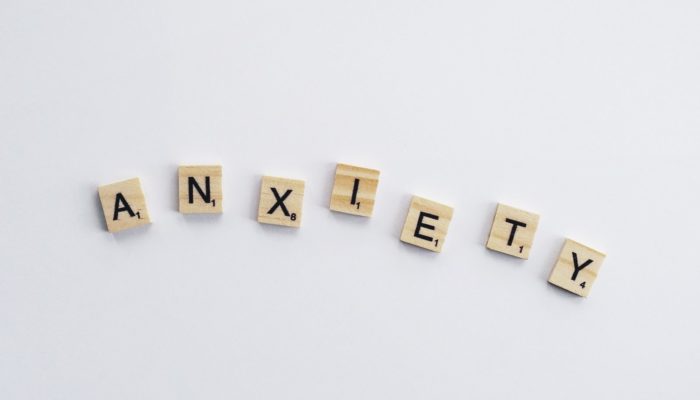
This Mind Your Head blog post is a follow-up from Jean Holloway’s talk during the online short course on mental health that aired during the last EGU General Assembly, where she discussed overcoming anxiety. Anxiety is excessive worry or fear, and is a normal part of life, until it becomes frequent or debilitating. This post is written by someone with lived experience as an academic who struggled with what felt like unbearable anxiety. It is an overview of what anxiety is, how to recognize it, some of the impacts, and some treatment options. If you would like to hear more about Jean’s personal journey overcoming anxiety and other mental health issues, including some more detailed tips on how to achieve this yourself, please see this EGU blog post.
What is anxiety?
Anxiety is extremely common, affecting about 30% of adults at least once in their lives (American Psychological Association). In particular, academia is an environment that can bring about extreme stress and anxiety. Recent studies have shown that mental health conditions are far more common in academia than in the general public (e.g. Bolotnyy et al., 2020). However, anxiety is quite a vague term. So what is anxiety? And how do you know you experience it?

Credit: Tim Gouw. Distributed via Pexels
According to the DSM-5 (the standard classification of disorders used by mental health professionals in the United States), anxiety is excessive worry or fear that occurs frequently. It goes beyond regular worry, and it is difficult to control. You can’t stop obsessing about it, no matter what you try. It’s often not in proportion to the given situation. Some anxiety is a normal part of everyday life, especially if you’re going through a particularly stressful period at work or in your personal affairs. Everyone experiences worry and fear sometimes. However, it becomes an anxiety disorder if it is persistent (more days than not over 6 months) and debilitating (the anxiety or physical symptoms are significantly impacting your social life, your work, and/or other important areas of life).
So, if you are reading this, and you think: “Well, I do worry about things sometimes, but it generally doesn’t affect my day to day life much…”, then you probably don’t have an anxiety disorder, and you are simply experiencing the highs and lows of life. However, if you are reading this and think: “Wow, I relate! There are days when I’m so paralyzed with fear that I can’t get any work done…”, then you may have an issue with anxiety. To get started, there are many signs and symptoms of high anxiety that you can look for, and this can help you follow up with a medical professional. Knowing the issue is an important first step!
Symptoms
So what can you look for in terms of symptoms? Extended periods of heightened anxiety can have both short- and long-term consequences on your physical and mental health. Acute symptoms can include:
- Restlessness or feeling on edge
- Fatigue
- Difficulty concentrating
- Irritability
- Muscle tension
- Difficulty falling or staying asleep
It may seem counter-intuitive that you can be both restless and fatigued. What I’ve found is that I get so wound up, my mind is racing so much, that I’m not sleeping properly or resting, so am left feeling constantly fatigued without being able to get the proper recharge. Although an anxiety disorder is diagnosed when you have symptoms for more days than not over a period of 6 months, this doesn’t mean that you’ll have the same symptoms every day. Some symptoms may only be triggered by certain events or situations. For example, if I have a big deadline at work, that can bring on periods of increased anxiety. I don’t sleep well, my thoughts are racing all the time, I have an elevated heart rate, and I feel like I’m amped up and am moving through the world at 2X speed. Once the deadline passes (or I do something healthy to reduce the anxiety), life returns to normal.
Sometimes symptoms get so bad that you can have a panic attack. The panic attack may be brought on by something unexpected (for example, running into someone you’re afraid of), or may occur randomly. Some physical symptoms of a panic attack include:
- Rapid heart rate
- Sweating
- Trembling or shaking
- Shortness of breath
- Chest pain
- Feeling dizzy, light-headed or faint
- Chills or hot flashes
Anxiety can also have long lasting and chronic health impacts. Over the long-term, anxiety and panic disorders can have consequences such as high blood pressure, headaches, dizziness, reduced libido, depression, and much more. You can read up on symptoms and different types of anxiety here.
Not all anxiety is the same
There are several types of anxiety disorders, or other types of obsessive thinking, depending on what you’re worrying about. If it’s about everything, then you may have a Generalized Anxiety Disorder. This is what I experience. Then there is panic disorder, where you have reoccurring panic attacks. If you are afraid of large gatherings or talking to people, you may have social anxiety. If you can’t stop obsessing about things or behaviour (in these days, for example about COVID-19 contamination), it may be obsessive-compulsive disorder. There is separation anxiety, if you are worrying about being disconnected from someone you’re attached to. If you can’t stop reliving or thinking about a traumatic event that occurred, you likely have post-traumatic stress disorder. If you’re obsessing about your weight or physical appearance, then you may have some type of eating disorder or body dysmorphia. These are just a few different types, and by far not the only ones. There are many things that can grow in your head from normal worry into debilitating anxiety. If excessive worry about anything is affecting your life, I would recommend going to see a therapist, counsellor, or doctor who can help you diagnose and help you find a way to come back to a more balanced life.

Credit: Les Finances
How does anxiety manifest in academia?
Knowing now what anxiety is and what could trigger it, academia seems like a breeding ground for neurotic individuals. It is, however, often not talked about or treated as a normal “part of the experience”, and something to just be accepted. This may work for some people, but not for everyone! Below are a few academia-specific situations that may trigger anxiety, with examples of my own symptoms.
The stressful and competitive environment
Stress has been shown to trigger anxiety (Mental Health First Aid). Academia is an extremely stressful and competitive environment, with heavy workloads, and we are often rewarded for working long hours or not having a good work-life balance. For me personally, anxiety kicks in for me when I can’t turn my brain off when I leave the office. During my comprehensive exams for my Ph.D., for example, I was absolutely terrified of failing. I would read all day, barely take any breaks because I felt guilty when I did. Even when I did try to “relax” I would find that I couldn’t sit still. I couldn’t even watch TV because I was so wound up. I stopped sleeping, and I ended up having a panic attack. Reducing this type of stress is one way to help manage anxiety. However, obviously, you can’t just say no to taking your exams. Therefore, the way forward is to find healthier ways to move through the fear and stress instead of ignoring and suppressing it.
Pressure to publish
The whole “publish or perish” attitude in academia induces chronic worry. I’ve found myself obsessing about doing things perfectly to reduce the chances of getting negative feedback. Even after the paper is published I find myself obsessing on what I should’ve done better. I got comments back from co-authors once, where one person suggested a major rewrite, and that sent me for a spiral. I couldn’t concentrate on any work, I stopped eating, I didn’t really sleep for days. This type of excessive worry is not necessary, and most certainly way out of proportion to that situation! It also terrifies me to think that I may make a mistake and then it’s out there, published, for everyone to see, forever… This type of anxiety can be related to imposter syndrome, and for more information on this please see Anne’s blog post.
Conferences and networking
The last thing I wanted to mention is conferences – where social anxiety comes alive and ruins your time! I worry a lot about how I am perceived, and conferences are scary because there are often a lot of people I’d like to impress. Public speaking can also induce anxiety or panic. I’ve found it helpful to break up long conference days with walks or social activities, and make sure to take lot of alone time to recharge. Networking and collaborating can be done in lots of ways, so don’t feel guilty if you are doing it your way! There is more than one way of doing it “right”.
Where can I get help?

Credit: Elly Fairytale. Distributed via Pexels
For some academics, anxiety may be overwhelming. This is no reason to quit academia though! If you recognized some of the acute symptoms of anxiety in yourself, here is the good news: you can improve your well-being in multiple ways! There are more and more treatment options these days. If you have a mild case of anxiety, often some simple lifestyle changes are sufficient to reduce symptoms. Some examples include meditation, stress management, reducing caffeine intake, getting regular sleep, exercise, and attending support groups. One of my personal favorite resources is the website of Dr. Zoë Ayres. She has a ton of good information on mental health in academia. You can also follow her on Twitter (@zjayres).
For moderate to severe cases, treatment can include different types of therapy, such as cognitive behavioral therapy, psychotherapy (“talk therapy”), and/or medication. If lifestyle changes are not sufficient, it may be a good idea to schedule a visit with your doctor or a mental health professional. This will help you get diagnosed and on the fast track to treatment, and a worry-free (or at least less) life! Talking with a therapist can help you learn to identify triggers and develop tools to cope with anxiety when it occurs. There are a variety of anti-anxiety medications, and they basically function to balance your brain chemistry or ward of severe symptoms. I beat my anxiety through a combination of lifestyle changes, support groups, and therapy. It is critical to get help early. Anxiety, like many other mental health conditions, can get worse with time and is then more difficult to treat.
The last thing I want to say is: please, just know that you are not alone. There are many others who are in the same boat, and it is not something to be ashamed of.
Disclaimer: Note that this post is not written by a medical professional and not a replacement for professional help. Seeking help is a sign of strength, not of weakness.
Written by Jean Holloway
Edited by Elenora van Rijsingen & Anne Pluymakers




